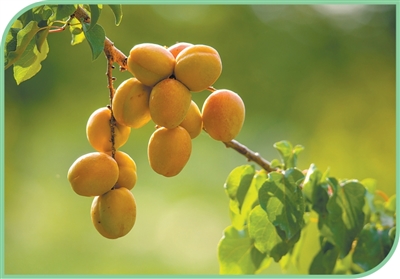




- BRNN
- BRI News
- BRNN News
- Database
Official Documents Polices and Regulations
Inter-government Documents International Cooperation BRI Countries
Business Guide Economic Data BRI Data
Trade
Investment Projects Latest projects
Cases - Content Pool

Photo shows a tree branch laden with apricots in Yingjisha county, Kashgar, northwest China's Xinjiang Uygur Autonomous Region. (Photo/Wang Qing)
For years, Yingjisha county in Kashgar, northwest China's Xinjiang Uygur Autonomous Region, faced a puzzling dilemma. Its local specialty, apricots, were prized for their exceptional flavor, yet the fruit was virtually unknown outside Xinjiang. Despite high yields, the short harvest season and low prices discouraged farmers from growing it. With a shelf life of just seven days, how could local apricots reach wider markets?
Since 2018, east China's Shandong Province has helped tackle the issue by building warehouses for specialty products from Xinjiang. By eliminating middlemen, accelerating transactions, and expanding sales channels, Shandong has helped over 240,000 tonnes of specialty farm products from Kashgar, including apricots, reach markets beyond the region, generating more than 8.25 billion yuan (about $1.15 billion) in sales.

People show apricots during an apricot competition in Yingjisha county, Kashgar, northwest China's Xinjiang Uygur Autonomous Region. (Photo/Wang Qing)
In late June, apricot harvest season arrived in Yingjisha. Local farmer Tuhenim Omer in Qiaolepan township felt confident. More than 4,000 kilometers away, companies in Shandong had already placed pre-orders for her apricots. Recently, the township organized residents and officials to pick apricots together. The apricots were taken to local cold storage facilities, where logistics companies picked them up. Within three days, cold-chain trucks carrying the fresh fruit would reach Shandong.
"Over the past three years, outbound logistics from Xinjiang have become more efficient, and Yingjisha's cold-chain transport system has steadily improved," said Qi Wei, deputy Party chief of Yingjisha and head of the assistance program carried out by Jining city of Shandong. As a result, Yingjisha apricots are finally making it out of the region as fresh fruit, Qi added.
Now that markets have opened up, the purchase price of Yingjisha apricots has risen from 2 yuan per kilogram to 15. In addition to cold-chain trucks, air freight and small-package cold-chain delivery are now in place. Last year alone, 2,000 tonnes of fresh Yingjisha apricots were delivered to dining tables across China.

Livestreamers promote apricots in front of the camera in Yingjisha county, Kashgar, northwest China's Xinjiang Uygur Autonomous Region. (Photo/Wang Qing)
"Even something as simple as selling apricots has changed drastically year by year," Qi said. Villages have set up cooperatives, towns and townships have established common prosperity companies, and Jining's aid office has sent experts to guide cultivation. An e-commerce center for the apricot industry has been built, and 187 field-side cold storage units have been completed in Yingjisha.
In recent years, Kashgar has developed key fruit and vegetable production zones, attracted food processing and pre-prepared meal companies, and built several deep-processing hubs. At the same time, cold-chain storage and logistics systems have continued to expand. It is now building 18 regional-level modern agricultural parks for fruits and vegetables.
"Getting products out of Xinjiang has long been difficult and costly. In 2018, we started to build warehouses for specialty products from Xinjiang," said Yuan Liang, deputy Party chief of Kashgar and head of Shandong's Xinjiang aid program.
"We've built fresh produce distribution centers in 10 cities in Shandong and in Xi'an, northwest China's Shaanxi Province. Through a shared warehousing model, we've made over 56,000 square meters of space available, with total capacity exceeding 180,000 tonnes. More than 60 Xinjiang companies use this system to preserve over 400 kinds of specialty farm products," Yuan added.

Tel:86-10-65363107, 86-10-65368220, 86-10-65363106